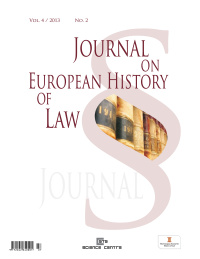Platz der munera sordida im Abgabensystem der Spätantike
Munera sordida in the later Roman System of Taxation
Author(s): Miklós KelemenSubject(s): Law, Constitution, Jurisprudence
Published by: Evropská společnost pro právní dějiny, z.s.
Keywords: Munera sordida; annona; capitatio-iugatio; munera extraordinaria; Diocletianus; dominates; curialis; Later Roman Empire; History of public administration; Taxation in the later Roman Empire.
Summary/Abstract: The levy which is the subject of our study (munera sordida), particularly combined the conceptual characteristics of the munus and the direct services as well. It is specific to the roman administration and organization that it evolved efficient and practical institutional and organizational solutions by reacting on emergent situations and problems. Although it is described accidental and under-organized by the literature. The ordinary tax burdens were consisted of the taxes based on imperial assessment (canonica) and the annually completions (consuetudine, ex more) determinated by different territorial customs. These burdens were distinguished from extraordinary taxes (extraordinaria onera/munera). The 'menial service' (munera sordida) were prescribed for the tax payers as extraordinary charges which could have been fulfilled in different forms (work, animal/equipment service). These burdens particularly combined the conceptual characteristics of the munus and direct services. From a certain perspective they formed a transitional group between the 'annona'-like and public burdens, and even between ordinary and extraordinary taxpayer services. Due to their characteristics, the munera sodida refer to organizational tasks, which are considered to be menial and ad hoc not like the annual tasks of the civilia munera. The tasks covered by the munera sordida were not provided by the subject of the burden but the tax payers living on the subject's estate. Therefore the burden was connected to the owner of the estate but considering its completion it was bound to estate itself. The burden which is the subject of our study, the munera sordida illustrates the purpose and character of the late roman levies well. The scope of its duties indicate the disproportion between the expectations of the imperial government and the performance of the population which has already reached its limits.
Journal: Journal on European History of Law
- Issue Year: 5/2014
- Issue No: 1
- Page Range: 104-110
- Page Count: 7
- Language: English

